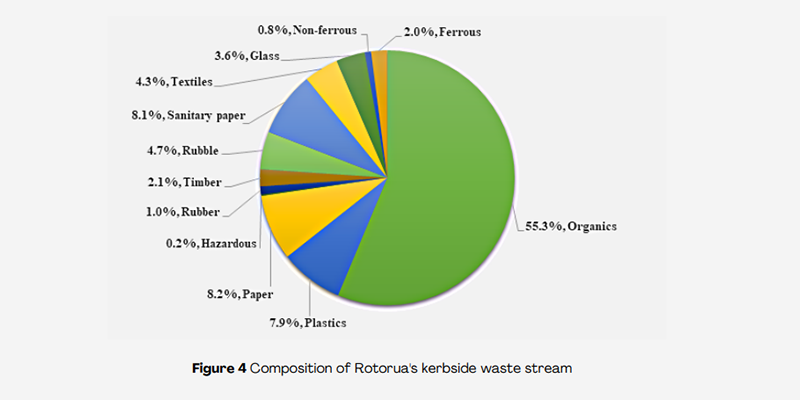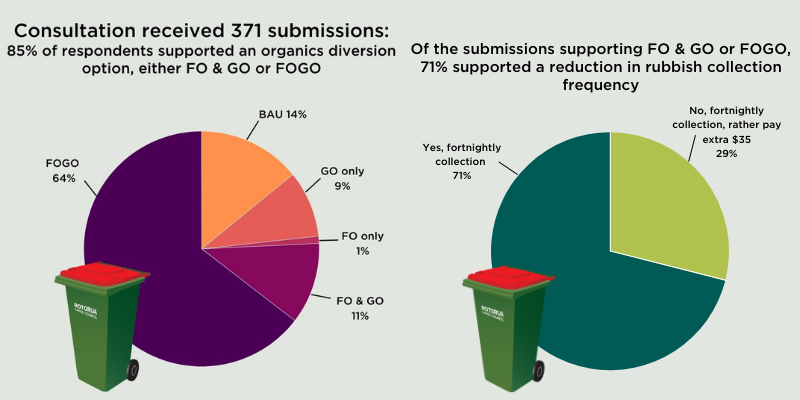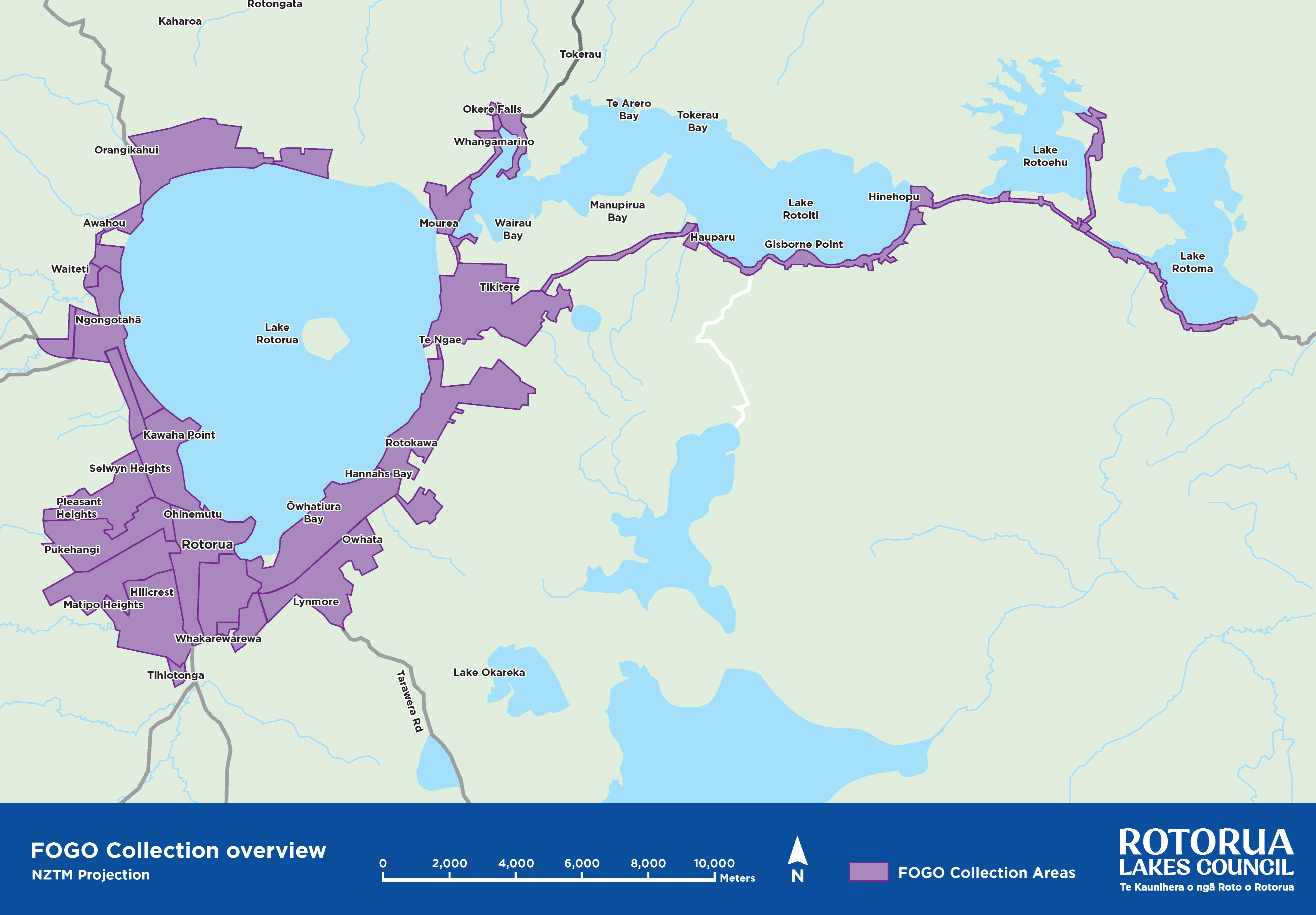Food Organic & Green Organic Waste Collection (FOGO)
New organic waste collection service
From July 2026, a new service will collect organic food and green waste from households and businesses in the Rotorua district.
Organic waste will be collected weekly with general waste moving to fortnightly.
About the new service
The new food organic and green organic (FOGO) waste collection service will be delivered by Rotorua Lakes Council’s waste contractor, Smart Environmental, from July 2026.
The new service will collect organic food and green waste which currently makes up over half of general waste (what you put in the red-lidded bin).
More detail will become available once logistics and planning for implementation are finalised. Council will run a community-wide awareness and education campaign during 2025, ahead of the service starting in July 2026.
Why we're introducing this service
Waste audits indicate food and garden organics make up about 55 per cent of household waste in our district. This service:
- Will reduce the amount of organic material going to landfill and, we hope, encourage more people to reduce, reuse and recycle waste
- Is estimated to halve the amount of landfilled kerbside waste and reduce our kerbside waste carbon footprint by 80 per cent.
How the decision was made
Council approved the introduction of a food organic and green organic waste collection service in July 2024 with a start date of 1 July 2026. Council previously signalled its intention to introduce kerbside organic waste collection in the Long-term Plan 2021-2031 and in its Waste Management and Minimisation Plan 2022-2028. Community consultation in 2022 attracted 371 submissions with 85 per cent of respondents supporting an organics/green diversion option.
In May 2023, the Infrastructure and Environment Committee approved a Food Organics Green Organics collection, with fortnightly collection of rubbish, as a preferred option following public consultation. Submissions received during public consultation held in May/June 2022 favoured a mixed collection of both food and garden waste (FOGO), ahead of four other options.
Most respondents who supported the FOGO option (71%), also supported a proposal to change rubbish collection frequency from weekly to fortnightly.
Council approved the introduction of the service in July 2024 with a start date of 1 July 2026.
Read the Waste Management & Minimisation Plan 2022-28 (PDF, 11.4MB)
Where the service will operate
The new service will provide an 80-litre bin to all households and businesses in the urban and primarily residential areas of the district. It will exclude all rural areas south of Waipa, rural agricultural areas north of Lake Rotorua, due to too few collection points and long travel distances, which are not economically or environmentally viable. Ōkāreka and Mamaku are also excluded.
A weekly rubbish collection will remain in place for those living outside the organic collection areas.
Factors taken into consideration in determining the service area included travel distances and the need to have sufficient collection points to ensure the service would be economically and environmentally viable.
Current red bag users will not be included in the initial roll-out of the service and potential collection of organic waste at transfer stations is being considered but not yet confirmed.
There is no option to opt out of the new service - the decision has been made to provide the service to all properties in the collection areas. Council can leverage its existing services and distribute the costs across its ratepayer base. This approach reduces expenses, makes the service economically viable and contributes to lowering landfill waste and greenhouse gas emissions.
Cost to ratepayers
The gross annual operating costs of the new service of $2.45m will be offset by reduced landfill costs of about $1.6m (based on 6000 tonnes of waste being diverted from the landfill), resulting in a net additional increase to the targeted rate of $24.71 per year. The more waste diverted from the landfill, the lower the cost of the service.
The diversion of organic waste can reduce the costs associated with landfill disposal. However, it also adds a new collection cost. The savings from landfill disposal will offset the cost of organics collection but will not make the organics diversion service cost neutral. The increase in the targeted rate is expected to cover the additional cost of collection.
The cost of sending household waste to landfill has continued to increase due to rising Central Government levies and changes to the Emissions Trading Scheme. These taxes comprise about 60 per cent of landfill costs.
About the bins and collections
What will be collected and where it goes
We are working with the contractor to finalise what can go in the organic bins.
The waste will be taken to Ecogas in Reporoa and processed using anaerobic digestion. The facility generates electricity, heat, biogas and fertiliser as a by-product, closing the food and energy loop by returning nutrients back into local soils.
Size of the organics bin
80 litres, compared with 140 litres capacity of the red lid bins and 240 litres for the yellow lid recycling bins.
Putting out the bins
- Your new organic waste bin will be collected weekly
- General rubbish (red-lid bin) will move from weekly to fortnightly, alternating with recycling bins/glass crates.
A collection calendar will be available in both hard copy and on the Rotorua Lakes Council website to help remind people of collection days.
There won’t be more bins out on collection days: there will be two bins to put out on general rubbish collection days (red lid bin + new organics bin) and up to three on recycling collection days (yellow lid bin + blue glass crate + new organics bin).
Why general waste collection is moving to fortnightly
Currently about half of our general waste is organic waste so as there will be less rubbish in your red bins once the new service starts. Fortnightly rubbish collection will also encourage the use of the organics bin.
People who need bigger or more bins, will still be able to get these for a fee (as they already can now). This is managed by Smart Environmental, and this cost is not included in Council's waste rate.
For more information, you can phone Smart Environmental on 07 346 8327 or email ro@smartenvironmental.co.nz.
A weekly rubbish collection will remain in place for those living outside the organic collection areas.
Further information
Previous updates
7 January 2025 – Media enquiry about various elements of the new organics collection service: 7 January 2025 - Rotorua Lakes Council
6 January 2025 – Contract awarded to organic waste collection service: Contract awarded for organic waste collection service - Rotorua Lakes Council
31 October 2024 – Organic waste collection part of annual plan discussions: 2025/2026 Annual Plan discussions begin - Rotorua Lakes Council
30 August 2023 – Media enquiry and RLC response re food and organic waste collection progress: 30 August 2023 - Rotorua Lakes Council
29 May 2023 – Rotorua a step closer to reducing waste carbon footprint through introduction of green and food waste collection: Council plans to reduce waste emissions - Rotorua Lakes Council
11 May 2023 – Procurement for organic waste collection to progress: Infrastructure and Environment Committee decisions - Rotorua Lakes Council
4 May 2023 – Approval sought to progress with organic waste collection – meeting preview: Infrastructure and Environment Committee agenda - Rotorua Lakes Council
16 May 2022 – Community consultation on proposed organic waste collection: Te Kohinga Pararopi - Organic Waste Collection | Let's talk | Kōrero mai
12 April 2022 - Council’s Strategy, Policy & Finance Committee asked to support going out to public consultation on the proposed introduction of a kerbside organic waste collection in Rotorua: On the Agenda - Rotorua Lakes Council
Information for businesses, larger households or assisted collections
Information for businesses
Businesses in urban areas that pay a targeted rate will receive organics diversion services.
Large businesses that produce large volumes of food waste are able to request additional or larger bins from the service provider, for a fee.
Very large commercial businesses are responsible for managing their own waste.
If you live in a multi-unit dwelling or apartment
Many multi-unit dwellings, fenced communities or apartments have different kerbside collection arrangements that have been discussed and finalised with the residents. For organics diversion, Council will continue to have a flexible approach and work with the residents and communities concerned.
Assisted collection
Assisted collection will continue to be available for residents who have trouble putting out the wheelie bins and/or glass crates for collection.
To apply or find out more, call Council’s Customer Solutions team on 07 348 4199. You will need a note or letter of support from a medical professional or health service with the application.
Home composters
Kerbside collection to complement home composting
Home composting has many advantages and Council’s Waste Management & Minimisation Plan supports home composting initiatives. Council will continue supporting home composting via community education and workshops, however this requires space, time, resources, and motivation that not all may have.
Many people who actively compost at home cannot compost all their food waste. Things that are difficult to compost include meat or cooked food scraps (those unlikely to create odour or pest issues).
Gardeners may also struggle to compost all their garden waste at home. Kerbside organics collection offers home composters an opportunity to improve their rate of diversion and further reduce their waste going to landfill.
Kerbside collection, followed by processing at a commercial facility, will:
- Ensure higher levels of household participation
- Provide an opportunity to divert almost all household organic waste
- Make monitoring easier to measure and report on performance.
Ask us a question
If you have a question that hasn't been answered here, please email: FOGO.Kerbside@rotorualc.nz.
We will also be updating this page as more detail on the service becomes available.




